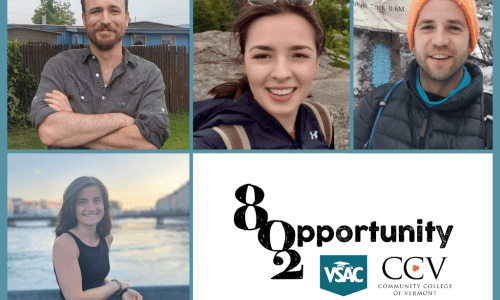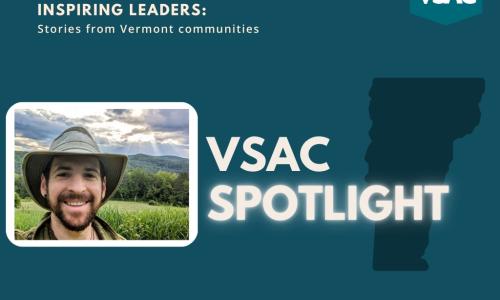Planning for college or training this year? Apply for the Vermont Grant.
For Sophia Desrochers, change is a leadership opportunity

Because of COVID-19, 18-year-old Sophia Desrochers wasn’t able to walk across the stage at a traditional high school graduation, and she wasn’t able to attend her senior prom. In fact, she wasn’t even able to visit the college she chose to attend, having to rely instead on a description of the campus from her soon-to-be freshman-year roommate.
Yet, none of this seems to phase Sophia, perhaps because adapting to change and rolling with the punches are nothing new to this resilient young woman.
When Sophia was five years old, she slipped and fell on her grandparents’ newly painted deck, which resulted in a cracked skull and bleeding on the brain. PET scans showed that there were regions of her brain that, in Sophia’s words, “had died; there wasn’t anything happening in those areas. So that set me back to when I was a toddler. I couldn’t even put sentences together.”
Compounded challenges
Because of the lasting impact of her head injury, Sophia has had her challenges in school, especially in math. “It changed my ability to learn; it set me back a lot,” Sophia says. She has also struggled with social skills, before her accident.
I was the most social person that you probably could have met. I’d just go up to a stranger and say hi. But now, I struggle with social anxiety, and it’s difficult for me to start conversations with people. I guess after my accident, I was so busy relearning how to do everything else that I never got the opportunity to have that social time in my life, where every other kid got it.
Then, on top of that, Sophia’s school, BFA Fairfax, transitioned from a traditional letter-grading scale to a new, proficiency-based evaluation system at the beginning of her seventh-grade year. “So it was even harder for me to understand what I had to do,” she says.
But rather than spending her time lamenting the change, Sophia turned it into a leadership opportunity, participating in a program called M3, where she learned about the changes at a series of seminars in Montpelier, then returned to Fairfax to teach her peers, as Sophia says, “what they needed to do to get through the next four years of their lives.”
Getting support to move forward
Sophia, whose own parents did not go to college, also had to lead the way when it came to her own college planning – though her dad, a FedEx driver, and her mom, a phlebotomist, gave her lots of support.
“I was in seventh grade when I started working with VSAC. The college process was overwhelming at first, but their programs made it easier for me to understand financial stuff,” she says – both because school doesn’t spend much time teaching financial skills, and because of having to overcome her own learning challenges. VSAC helped her gain a handle on what her financial needs would be. “And then I started to realize: ‘Oh, this is serious. I actually need to understand what I would be able to do for loans, how I’m going to afford this.’”
While her dad, who served in the military and was deployed to Afghanistan for a time while Sophia was younger, is able to transfer part of his GI Bill benefit to Sophia and her younger sister, Sophia is quick to point out that “that’s not a reason for me not to think about how to plan for college. Because I’m still going to have to take out loans for books, housing, anything else I need.” Plus, the school she chose – the Massachusetts College of Pharmacy and Health Sciences -- is located in Boston, one of the more expensive places to live.
“Another thing VSAC taught me that I will probably remember for the rest of my life is time management,” she says. “All three of my counselors really pounded into my head that you can't put off certain things, like getting your application and your scholarships done on time.”
Clearly, Sophia heeded that advice. The third week into her senior year, she was already applying to colleges, had applied for scholarships, and had her FAFSA form filled out.
“And it turns out, I’ve got it all put together,” Sophia says proudly. “I’ve done the calculations. For the first year, I’m only going to have to take out hopefully two loans, and that’s just for books and a computer.”
Sophia, who anticipates graduating from her three-year college program with both a nursing degree and a master’s, is clearly appreciative of the newfound opportunities she has as a first-generation college student.
VSAC has given me the opportunity to realize I have something that my parents didn’t get, and neither did my grandparents get. And I’m very lucky to have this opportunity. Without VSAC, I probably would not have gone to college at all. Because I didn’t want to burden my parents with having to take out loans and having to pay for my tuition. Then I realized, ‘Oh, actually there’s a way for me to be able to do this.’






